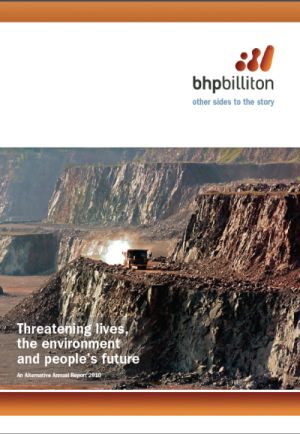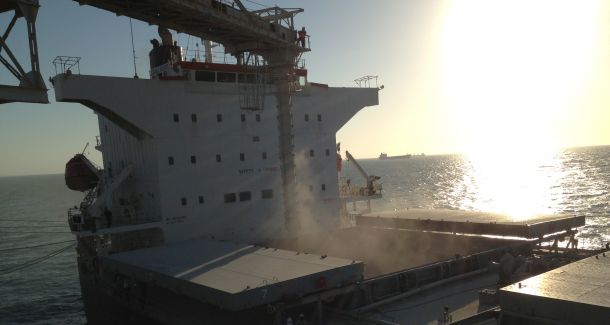
The international network BHP Billiton Watch dedicated a chapter to the Western Sahara issue when they this week launched its BHP Alternative Annual Report for 2010. The report was published before the BHP announced its withdrawal from the plans of buying Western Sahara phosphate plunderer.

See the webpages of the network here.
You can download the full report here.
The report, called Other Sides to the Story: Threatening Lives, the Environment and People’s Future, was launched in November 2010, few weeks before BHP announced its intention not to pursue the take-over of PCS.
See the chapter on Western Sahara below.
-----------------------------------------------------------------
Western Sahara: The Bou Craa Mine
In August 2010, BHP Billiton announced its interest in acquiring the US-Canadian fertiliser firm PotashCorp (PCS). If BHP Billiton succeeds in its possible take-over, it will be forced to either actively support or directly undermine the UN’s work to decolonise the last colony in Africa. For decades, the fertiliser producer PCS has been importing phosphates from Western Sahara, a territory largely occupied by Morocco since 1975. To this day, no state or international organisation recognises Morocco’s sovereignty over the resource-rich territory.
The United Nations lists Western Sahara as a so-called Non-Self Governing Territory pending the process of decolonisation. Furthermore, the UN has repeatedly stated that the illegal occupation must end and that the Saharawi population is entitled to freely exercise their right to self-determination through a free, fair and transparent referendum – something which Morocco continues to block.
The large Bou Craa phosphate deposits in the northern part of Western Sahara played a large role in triggering the Moroccan invasion of the territory. A UN delegation that visited the territory formerly known as Spanish Sahara in 1975, as part of the decolonisation of the territory, stated that “eventually the territory will be among one of the largest exporters of phosphate in the world”.
According to their assessment, a free Western Sahara would become the second largest phosphate exporter, after Morocco itself. However, just a few months later, Morocco invaded Western Sahara and took control over the Bou Craa mines. Following the Moroccan take-over, almost all Saharawi workers have been replaced with Moroccan settlers. Nearly all important posts of the firm are controlled by Moroccans. Today, the phosphate production in Bou Craa amounts to 10 % of Morocco’s total production; Bou Craa’s annual production is around 3 million tonnes, contributing substantially to Morocco’s national income. The sacked indigenous workers protest the plunder, or languish in the refugee camps in Algeria, dependent on foreign humanitarian aid. None of the proceeds of the phosphate industry are sent to these refugees. Some of the largest shipments that are exported to PCS in the US can be worth as much as the annual multilateral humanitarian aid to the refugees.
For over 35 years Morocco has illegally exploited Western Sahara’s natural resources against the explicit will of the territory’s indigenous population, the Saharawi people. The revenues are poured into furthering Morocco’s brutal and illegal military occupation. By importing phosphates from the territory, PCS today supports the continuation of the illegal occupation of Western Sahara and helps to
undermine the UN peace process.
PCS is the largest purchaser of phosphate from Western Sahara, a position the firm has held for many years. The money from phosphate extraction and trade goes directly to the Moroccan state-owned company located in Western Sahara, Office Chérifien des Phosphates. “This support needs to end so that Morocco engages with the UN referendum process. The phosphate trade in Western Sahara increases the risk of further armed conflict, destabilisation and suffering in the region”, stated Sara Eyckmans, co-ordinator of Western Sahara Resource Watch.
If it acquires PCS, BHP Billiton will inherit the North American firm’s trade relations with the Moroccan
government-owned firm in the occupied territory. As a potential new owner of PotashCorp, BHP Billiton has the opportunity to address the issue of PCS’s phosphate imports from occupied Western Sahara and thus to help end the conflict. Alternatively, should it not bring the imports to a halt after taking over PCS, BHP Billiton will be the largest private funder of the illegal and brutal occupation of Western Sahara.
On 3 November, the Canadian Government announced its intention to block BHP Billiton’s acquisition of Potash Corp. BHP Billiton has thirty days to appeal before the Canadian Government makes its final ruling.
New report: Western Sahara phosphate trade halved
The export of phosphate rock from occupied Western Sahara has never been lower than in 2019. This is revealed in the new WSRW report P for Plunder, published today.
New report on Western Sahara phosphate industry out now
Morocco shipped 1.93 million tonnes of phosphate out of occupied Western Sahara in 2018, worth an estimated $164 million, new report shows. Here is all you need to know about the volume, values, vessels and clients.
US imports of Western Sahara conflict rock to end
A landmark decision has been made. The large-scale exports of conflict phosphates from occupied Western Sahara to the United States will stop this year.
Key player quits dirty Western Sahara phosphate game
One of the most important companies in the controversial phosphate business in Western Sahara is ending its involvement. Innophos Holding's exit might lead to the US totally terminating its decade-long imports from the occupied territory.



